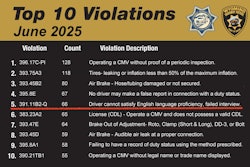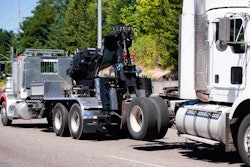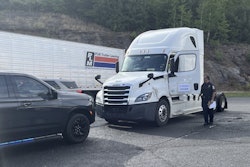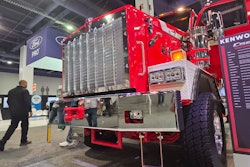DOT Secretary Sean Duffy testified before the House Transportation and Infrastructure Committee hearing overseeing the department's policies, programs, and fiscal-year 2026 budget requests.
The hearing took on a wide range of issues across all modes of transport covered by the DOT. Duffy's opening statement recalled that on the very day he took office, a deadly plane-helicopter collision over the Potomac River turned his attention to aviation and served as a "sobering reminder of why the department's priority is and must always be safety."
Truck parking, billboard lawyers, split sleeper regs and med certs
Duffy heard from Representatives directly about potentially redirecting EV-charger funding dollars toward truck parking and other trucking-facing issues. On the same day, DOT announced a $500 million funding package for surface infrastructure, including $25 million to West Virginia to expand truck parking in Cabell, Monongalia and Berkeley counties along I-81, I-64 and I-79. Duffy criticized the previous administration as having set aside money for infrastructure projects but not actually awarding grants, leaving what he described as a backlog of 3,200 grants for DOT to review.
Georgia rep Mike Collins, a former truck driver and small fleet owner, asked the most direct trucking-related questions. Collins said Duffy "can increase productivity and efficiency in trucking" by going after billboard lawyers and nuclear verdicts. Collins said anxiety over litigation had made shippers unwilling to allow truckers to park on-site at their facilities.

[Related: Truck parking shortage partly responsible for deadly 2023 crash: NTSB]
"Shippers will not allow you to stay on the yard," he said. He said truck drivers parking at shippers could better use available hours "so that while loading and unloading, [you can] take your break, have your hours right there." Collins suggested that if more shippers would allow longer term parking on-site, new lot builds wouldn't be needed.
Collins pressed the Secretary on split-sleeper berth rules, too, saying DOT should allow all possible split options.
DOT recently announced a pilot program to test other split-sleeper birth configurations "offering more flexibility," Duffy said. Duffy quickly mentioned cargo theft and double brokering as other issues to tackle. Recent press from Duffy has mentioned targeting "illegal brokering" activity, and the Federal Motor Carrier Safety Administration has made it clear to Overdrive they're looking to the in-progress broker transparency rulemaking as a possible solution.
Collins concluded by saying the FMCSA's new electronic medical certification system, which requires electronic submissions of medical exam results from examiners straight to FMCSA, "works fine." Yet not every state has gotten on board with the new system, and FMCSA this week granted some leeway to drivers and carriers in the meantime. (Duffy noted he eventually gave up his own CDL after holding one for 30 years when he was made to wait three hours for a medical certification in New Jersey.)
Representatives only had three minutes allotted to question the witness in the hearing, so the conversation went fast with Collins and the other members.










